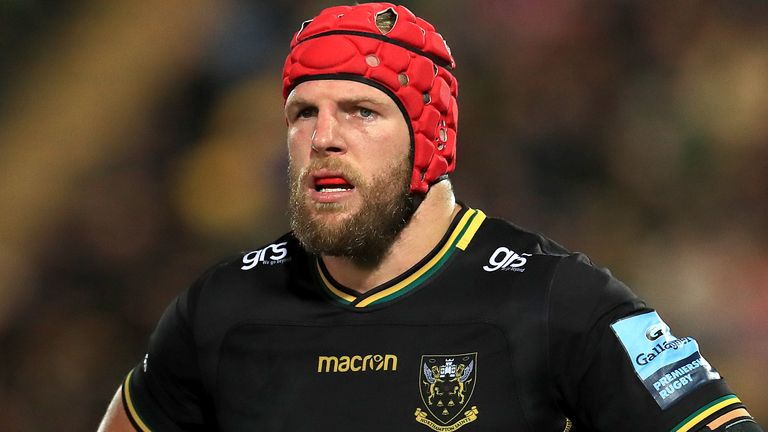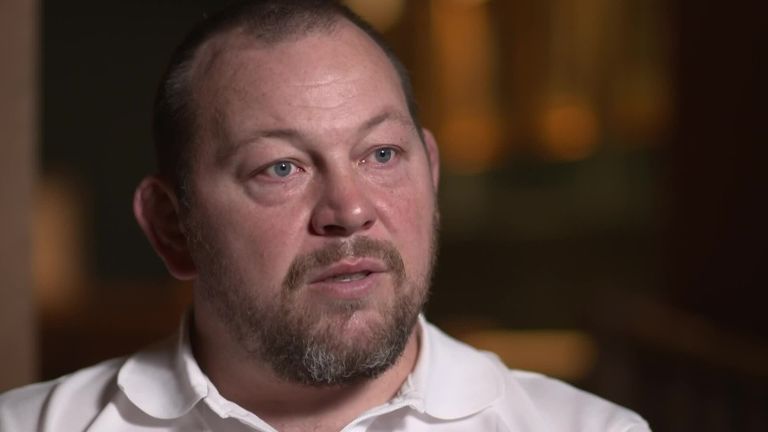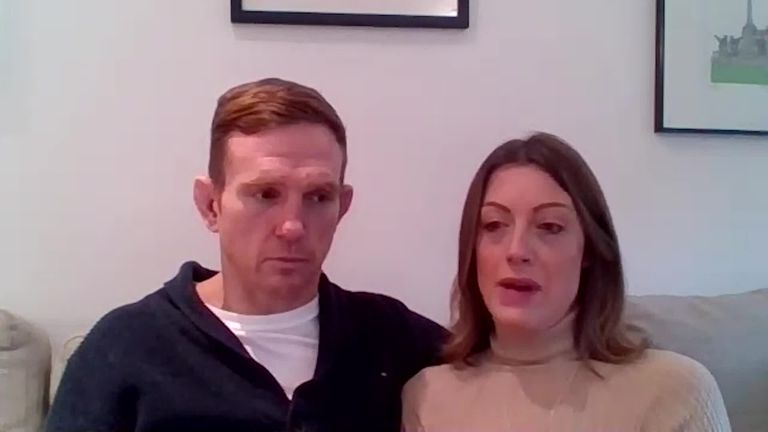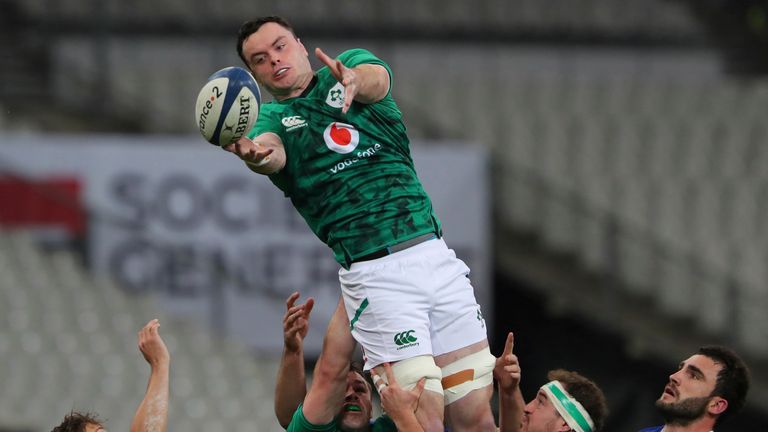Concussion in sport: James Haskell, involved in Progressive Rugby group, urges World Rugby to tackle brain trauma
James Haskell and Wales back-rower Josh Navidi part of lobby group Progressive Rugby group which has written an open letter to World Rugby outlining concerns over player safety and provides a plan to reform the game in order to reduce head injuries within rugby union.
Thursday 18 February 2021 11:48, UK
Former England flanker James Haskell has urged World Rugby to do more to tackle brain trauma, warning that “without change, the sport is threatened with extinction within a couple of generations”.
Haskell and Wales back-rower Josh Navidi have helped establish Progressive Rugby, a new lobby group calling for urgent reform in the sport.
In an open letter to World Rugby, the group outlined its concerns along with a suggested plan of action to improve overall safety.
These proposals include a limit on contact in training, restricting match substitutions to injured players only - to reduce the incidence of fresh players making high-impact tackles on tired players - and a guaranteed minimum number of days off between seasons.
World Rugby issued a statement in response to Progressive Rugby's open letter, stressing "the welfare of the global rugby family is, and has always been" its "priority".
Trending
- World Darts Championship LIVE! Clayton in action after Heta nine-darter
- Transfer Centre LIVE! Yamal set to sign new Barcelona deal
- World Darts Championship schedule: Bunting, Price, Humphries headline Friday
- Amorim calls for time but warns every manager is in danger of sack
- Best moment of the Worlds so far?! Heta's nine-darter sends Ally Pally wild!
- Liverpool latest: Slot talks Van Dijk levels and future
- Ref Watch: Was Onana fouled for Cunha corner goal?
- Ref Watch: Was Duran right to be sent off vs Newcastle?
- No Saka for Arsenal vs Ipswich: Preview & predict the score!
- Chelsea latest: Madueke not selected as 'competition has to be higher'
- Steve Thompson: I can't remember World Cup final
- Popham: Reduce contact in training
- 'Rugby union facing brain disease epidemic'
They added several of the proposed initiatives are already operational or are being examined.
Haskell, 35, who played for Wasps and Northampton, said the intensity of training sessions should be modified and questioned the science behind the reduction in the mandatory concussion break from three weeks to one week.
"Everything I do in rugby, I always have concerns that they were very slow moving and that so much of what we do in a team sport was out of fear," Haskell said.
"If you did not beat each other up (in training) on a Tuesday, then you are not prepared for a Saturday - but that is down to mental preparation, so I always wondered why we were doing so much extra training.
"I was always concerned that we are doing things out of fear and never out of science."
England World Cup winner Steve Thompson is among a group of former players suffering early-onset dementia symptoms who are taking legal action against rugby's top governing bodies.
World Rugby chairman Sir Bill Beaumont wrote an open letter in December in response to the lawsuit, in which he said as "the science continues to evolve" rugby will "evolve with it".
Former Wales number eight Alix Popham is another suffering from probable chronic traumatic encephalopathy (CTE) and he along with former Canada international Jamie Cudmore have backed Progressive Rugby.
"We can certainly look after players better, in how they approach concussion - so much of it gets brushed under the carpet or it isn't done. We chose to ignore lots of things," Haskell added.
"There are players like Alix (Popham) and my former team-mate Dylan Hartley, who have got concerns whether they are going to get early onset dementia.
"We need to take a stand and I don't think as a physical game we can be that much safer, but we can do so much more for players.
"Why is a physio assessing a head injury? Where did they go to study neurology? There is so much more we can do in those areas."
Progressive Rugby, which also comprises coaches, referees, teachers at rugby-playing schools and medical experts such as Dr Barry O'Driscoll, a former advisor to the International Rugby Board (now World Rugby).
O'Driscoll stepped down from his role with the IRB to protest against the governing body's concussion protocols and head injury assessments.
"It was going wrong, and going wrong badly - and has gone worse since," he said.
"Training has got harder, the impacts have got bigger and there are more head injuries than ever."
Within the letter, Progressive Rugby said: "We consider in view of the evidence of risk for traumatic brain injuries occurring in rugby union that more should be done to protect the rugby-playing community from the dangers of injury and that World Rugby has a moral and legal duty to minimise risk and to inform players and parents of the risk of brain damage from repeated knocks.
"Evidence of the existence of brain disorders in retired players supports the contention that participation in rugby union can cause brain damage."
The letter suggested a number of measures that should be taken to limit head injuries in the game, including limiting contact between players in training, and a review of double-teaming tackles and upper level of tackle height.
Among additional measures, the group also put forward a guaranteed number of days off for players in-between seasons and increased education of head injuries.
RPA chairman Waller: Brain damage not like breaking a leg
Newly appointed Rugby Players' Association chairman Ethan Waller says that the organisation's top priority is player welfare - including brain and mental health.
The RFU's medical figures in December revealed that one in five professional rugby union players in England had a concussion during the 2018-19 season. Those figures represented greater than a four per cent increase of players who sustained concussions during the previous campaign.
Waller backs the call for a sport-wide concussion database and limited contact in training to help prevent further head damage among players.
Waller told Sky Sports News: "It's different at each club, but research shows that a lot of injuries do come from training including head injuries.
"It's clearly an area to look at. There needs to be a balance of what's safe so that players don't get injured - because if you do 'no contact', it also can end up being detrimental, so it's about finding the balance of what's a safe amount to do and finding that middle ground for what's best for our players."
The prevalence of concussions has been under sharp scrutiny in recent months with a number of former players launching a legal case against the sport's authorities.
Scotland's Zander Fagerson has been banned for the rest of the Six Nations after receiving a red card for making contact with Alun Wyn Jones' head when launching himself into a ruck against Wales.
Waller believes that contact with the head should result in a red card and reckless clear-outs need to be removed from the game.
Waller added: "Head contact is not like breaking a leg where you can go have an operation and get it fixed - the damage that you could be doing to your brain is something that you may not know about for years.
"I think the way it's been refereed is spot on because you can't be having those kinds of reckless clear-outs or those kinds of contacts to the head constantly.
"The more deterrents we have against that, the less likely you are to see those things and games to be won or lost on the back of a red card. You're more likely to see, from a supporter's point of view, a better spectacle when that begins to filter out of the game."







